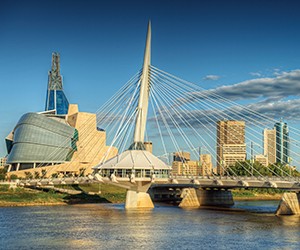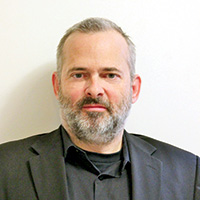The western provinces of British Columbia, Alberta, Saskatchewan and Manitoba are major gearwheels in the Canadian economy. With natural resources anchoring a solid footing in oil and gas, mining, forestry and agriculture, sector diversification runs the gamut, from medicine and computer graphics in Vancouver to clean energy and food security in Saskatoon.
As a result, business opportunities abound in the region’s main cities—strongly aligned with the meetings industry.
British Columbia
After hosting 4,000-plus influential meeting planners for the 60th edition of PCMA’s annual Convening Leaders event in January 2016, Vancouver continues to add convention muscle on an ever-widening number of business fronts.
“With traditional resource-based industries including mining, forestry, lumber, aquaculture and shipping providing a stable base for attracting meetings and conferences, our focus as a DMO is to develop new business opportunities,” said Dave Gazley, Tourism Vancouver’s vice president of meeting and convention sales. “In that respect, we are seeing particular success with international medical conferences, along with insurance, financial, gaming, graphics and other areas of technology, knowledge and innovation.”
Launched in 1996, Tourism Vancouver’s “Be a Host” program has seen over 1,000 local hosts bring their meetings, conferences, congresses and symposiums to the city over the past two decades.
Integral to Vancouver earning International Congress and Convention Association honors as North America’s leading city for international meetings in 2014, the Vancouver Convention Centre offers a total of 466,500 square feet of meeting space. As the world’s first LEED Platinum-certified meetings facility, the Centre also stands out with its six-acre living roof, advanced technology, stunning curves and scenic views.
The city’s recent developments include downtown’s 147-room Trump International Hotel & Tower Vancouver. Slated to open this fall, parq Vancouver is a new $700- million “urban resort” featuring a casino, 329-room JW Marriott hotel and 188-room Marriott Autograph Collection property.
Alberta
In Calgary, Canada’s energy capital, a well-rounded economy and business-first mindset powers a dynamic meetings scene.
As Canada’s technology start-up leader, Calgary claims more than 135 national corporate head offices, the highest per capita in the country, and Canada’s youngest, brightest workforce, with 60 percent of Calgarians holding post-secondary degrees.
“With a wealth of intellectual capital in the energy, technology, financial, transportation, real estate, film/creative and manufacturing industries, Calgary is where collaboration, innovation and meaningful relationships begin,” said Dave Sclanders, executive director of Meetings + Conventions Calgary. “More than a place to meet, Calgary is where we connect visitors with our city’s greatest resource—Calgarians.”
The bureau leverages that resource via its Champions program, which invites local leaders to partner with Meetings + Conventions Calgary to attract and create meetings for their organization.
Major venues include downtown’s Calgary TELUS Convention Centre and the BMO Centre, Calgary’s largest meetings facility. Covering more than six football fields, the venue, located at the famed Calgary Stampede complex, hosts major events like the Global Petroleum Show.
Heritage Park venues include the energy-themed Gasoline Alley Museum, with reception space for 1,000 in the Grand Hall amid vintage automotive memorabilia.
The Canadian Beef Centre of Excellence, created in 2015 to promote the “Canada Beef” brand worldwide, offers rental spaces that include a test kitchen, boardroom and 25-seat Demonstration Theatre.
Opened last summer, Studio Bell is the new $168 million, 160,000-square-foot home of the National Music Centre. Featuring a 2,000-plus piece collection on five exhibition floors, including The Rolling Stones’ iconic 1970s mobile recording studio, the venue can host up to 1,500.
October 2016 saw the debut of the 318-room Calgary Airport Marriott In-Terminal Hotel in YYC Calgary International Airport’s new International Terminal. This month sees the anticipated opening of the 142-room Element Calgary Airport.
In Edmonton, “sustainable visitation” is a leading strategic initiative.
PageBreak
“We work closely with our stakeholders, major venues and business divisions of the Edmonton Economic Development Corporation to see where we might work together to bring meetings and conventions to Edmonton,” said Maggie Davison, vice president of Edmonton Tourism. “All of our work, from our international trade teams to consumer marketing, is in pursuit of an accelerated inflow of new business, investment, visitors and residents.”
Last fall saw the debut of the 18,641-seat Rogers Place arena. Home of the Edmonton Oilers, the multiuse venue is the only LEED Silver-certified NHL arena in Canada and centerpiece of the new 25-acre Ice District. The project has reportedly helped to catalyze some $5 billion in downtown development.
Key group venues include the multifunctional Northlands complex; Shaw Conference Centre; 522,000-square-foot EXPO Centre; and Fort Edmonton Park, set on 158 wooded acres.
Manitoba
Boasting 14 main industry sectors, including aerospace and heavy vehicle manufacturing, Manitoba’s diverse economy is centered in the Winnipeg capital region.
“Winnipeg is a happening city, with infrastructure investments that include the RBC Convention Centre Winnipeg and new and newly renovated hotels,” said Chantal Sturk-Nadeau, senior vice president of Tourism Winnipeg. “Across the city, world-class attractions, new retail investments, and an exploding culinary scene all have Winnipeg gaining momentum and set us apart as a premier meeting and convention destination.”
Unveiled last year, the $180 million-plus expansion and upgrade of the RBC Convention Centre Winnipeg boosted total rentable space to 260,000 square feet. Built to LEED Silver standards, highlights include the new 24,000-square-foot main floor ballroom, and an increase to 131,000 square feet of contiguous space for the third-floor exhibition hall.
Connected to the venue and to the multipurpose MTS Centre arena by skywalk, Delta Winnipeg, in Winnipeg’s Sports, Hospitality and Entertainment District (SHED), offers 393 renovated guest rooms and 19,000-plus square feet of space.
The Canadian Museum for Human Rights hosts receptions for 700, while Fort Gibraltar, showcasing Winnipeg’s fur-trading past, hosts functions for 200.
Saskatchewan
Complementing a meetings set that includes government, agriculture, telecommunications, financial services, data management and oil and gas production in the provincial capital of Regina, the larger city of Saskatoon further extends Saskatchewan’s sector diversity.
“Hosting conferences that align with our existing sectors of strength are the tip of the trade and investment spear,” said Todd Brandt, president and CEO of Tourism Saskatoon. “Accordingly, our efforts as a DMO are focused specifically on Saskatoon’s areas of international competitiveness, including science and research, medical, clean energy, mining, infrastructure, food security, agriculture and biotechnology.”
Specializing in conferences for up to 1,500 and tradeshows of up to 120 booths, TCU Place offers 104,000-plus square feet of space. Five minutes from downtown Saskatoon, recently upgraded Prairieland Park offers 240,000 square feet of space.
Groups can tour Canadian Light Source at the University of Saskatchewan in Saskatoon, the national center for synchrotron (brilliant light for studying the microstructure and chemical properties of materials) research, one of the largest science projects in Canadian history.
Slated to open this year, the Remai Modern Gallery will be Canada’s largest modern art gallery and offer meeting space.







